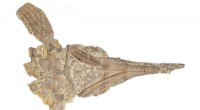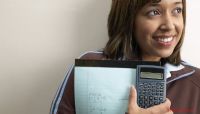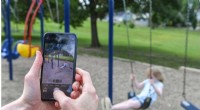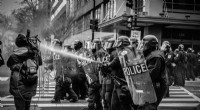
Wetenschap
Hoe voeren gevaccineerde leraren uit Nieuw-Zeeland die moeilijke gesprekken met hun antivax-collega's?
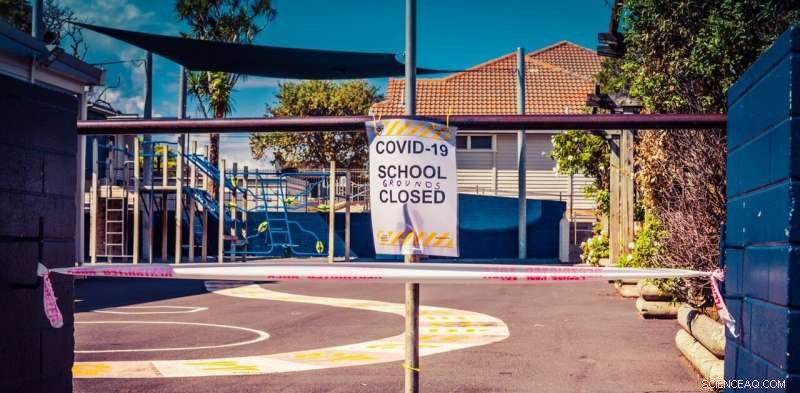
Tegoed:Shutterstock
Het nieuws dat alle personeelsleden van een kleine King Country-school een week na de verplichte deadline van de regering van 15 november nog steeds niet waren ingeënt, onderstreept hoe uitdagend de komende weken zouden kunnen zijn.
Aanstaande maandag is de dag dat leraren ten minste één dosis van het COVID-19-vaccin moeten hebben gekregen als ze willen blijven werken met studenten in een persoonlijke leeromgeving.
Het zal ook de dag zijn dat onderwijsleiders er met enige zekerheid achter komen wie hun vaccin-aarzelende collega's zijn, en wanneer de loopbaantrajecten van veel toegewijde opvoeders op een kruispunt zullen komen.
Aangezien het waarschijnlijk lijkt dat sommige scholen te maken zullen krijgen met aanzienlijke personeelstekorten, moet het lerarenberoep nu serieus worstelen met hoe de waarde van manaakitanga aan alle collega's kan worden getoond, inclusief de niet-gevaccineerde.
COVID-19:al het personeel van de kleine King Country-school weigert vaccin tegen de deadline van volgende week https://t.co/fDKGzVpbj9
— RNZ Nieuws (@rnz_news) 8 november 2021
De verantwoordelijkheidscode
Als volledig geregistreerde leraar (evenals een academicus) zal ik vrij zijn om les te geven op scholen in Nieuw-Zeeland, als de alarmniveaus dat toelaten, omdat ik dubbel gevaccineerd ben. Maar ik weet dat dat niet het geval is voor sommige van mijn zeer getalenteerde en toegewijde collega's die de Pfizer-prik hebben geweigerd.
Ik kan me alleen maar de professionele identiteitscrises voorstellen die deze collega's moeten doormaken.
Ik denk aan die leraren die oprecht geloven dat ze hun inzet voor de samenleving nakomen - omarmd in de Teaching Council of Aotearoa New Zealand (TCANZ) Code of Professional Responsibility - door op te komen voor de mensenrechten van Nieuw-Zeelanders op lichamelijke autonomie.
Ik denk aan die leraren die hartstochtelijk geloven dat ze hun inzet voor de samenleving nakomen door de ethische integriteit te tonen om op te komen tegen een macht waarvan zij denken dat die het publiek misleidt.
Ik denk aan die leraren die geloven dat ze "de praatjes houden" van een kritisch reflectieve beoefenaar door te weigeren zich te laten vaccineren.
En ik denk aan mijn eigen toewijding aan die leraren als mijn professionele collega's, ondanks mijn fundamentele onenigheid met hun anti-vaccinatie-opvattingen.
Lesgeven als een ethische activiteit
Het TCANZ-leidend document voor leraren - Onze Code, Onze Normen - schetst de ethische verplichtingen van alle leraren. The council recognizes that for the code to be "owned," the professional commitments should not be seen as a list of prescribed rules.
Rather, it is a set of agreed aspirations that encourage collaborative conversations between practitioners about the ethical nature of their work.
There is no doubt the vaccine mandate will demand some of the most ethically challenging conversations teachers from both vaccination camps will have in their professional careers.
However, that's no reason to shy away from collegial awkwardness. One of New Zealand's pre-eminent educational thinkers, the late Ivan Snook, believed teaching is an innately ethical activity as it involves close personal relationships, not least between colleagues.
Snook also provides us with some wise guidance on how we might go about these challenging discussions. He addresses the fundamental tension teachers face when trying to persuade others to take a on a point of view they believe is demonstrably rational.
Snook frames this tension as the "conflicting obligations to respect the learner's state of mind and also move her towards a more adequate understanding and a more enlightened practice."
An ethic of care
As colleagues in discussion with those who disagree with us on the vaccine mandate, we must be ready to respect the ethical integrity of alternative viewpoints, while providing rational alternatives based on reputable scientific evidence.
Nor should we decry those who distrust authority. As Snook argues, a major task of educators is to help others come to understand the importance, and limitations, of all authorities.
It is my hope that over the next few months we will see the code truly become "our code" as it guides vaccinated and unvaccinated teachers to have these respectful conversations about what it is to be a critically reflective, ethical teacher in a society in the grip of a global pandemic.
But if the code is to guide teachers through these difficult conversations it needs to be used with care. If it's simply a weapon of entrenched positions there is nothing to be gained.
Educational philosopher Nel Noddings said conversations of this complexity need to happen within an "ethic of care" that is sensitive to the relationships in which we must all continue to live.
In the spirit of whanaungatanga, I encourage my vaccinated and unvaccinated colleagues to be courageous and use the code to discuss the vaccine mandate within such an ethic of care.
Let us decide together what that is, and what it means to be an ethical teacher in Aotearoa New Zealand in this watershed moment for our profession.
 Kunststoffen kunnen een tweede leven krijgen als biologisch afbreekbare oppervlakteactieve stoffen
Kunststoffen kunnen een tweede leven krijgen als biologisch afbreekbare oppervlakteactieve stoffen Proces verwijdert tegelijkertijd giftige metalen en zout om schoon water te produceren
Proces verwijdert tegelijkertijd giftige metalen en zout om schoon water te produceren De rol van vastestofchemie bij de ontwikkeling van metaal-ionbatterijen
De rol van vastestofchemie bij de ontwikkeling van metaal-ionbatterijen Hoe chemische reacties worden berekend
Hoe chemische reacties worden berekend Studie gebruikt neutronen om licht te laten schijnen op het afsluiten van kankercellen
Studie gebruikt neutronen om licht te laten schijnen op het afsluiten van kankercellen
Hoofdlijnen
- Wat is het verschil tussen een nucleotide en een nucleoside?
- Lovelorn koala gepakt na ontsnapping uit dierentuin op jacht naar partner
- Hebben octopussen, inktvissen en krabben emoties?
- Symbiotische schimmels suggereren biocontrole-implicaties voor plaagkevers
- De 3 soorten bacteriën
- Welke moleculen komen in de Krebs-cyclus en welke moleculen verlaten de Krebs-cyclus?
- Wat zijn de 10 Major Body Systems?
- Twee nieuwe ontdekkingen werpen licht op het mysterie van hoe cellen omgaan met stress
- Vroegste gibbonfossiel gevonden in het zuidwesten van China
 5 manieren om consumenten te verschuiven naar duurzaam gedrag
5 manieren om consumenten te verschuiven naar duurzaam gedrag Religieuze discriminatie bijzonder hoog voor joden en moslims, studie toont
Religieuze discriminatie bijzonder hoog voor joden en moslims, studie toont Optimale samenwerking bereiken wanneer doelen conflicteren
Optimale samenwerking bereiken wanneer doelen conflicteren Hoe zonne-energie de atmosfeer van de aarde beïnvloedt
Hoe zonne-energie de atmosfeer van de aarde beïnvloedt  Australische waakhond bereidt zich voor op Google, Facebook
Australische waakhond bereidt zich voor op Google, Facebook Wat zijn voorbeelden van mechanische verwering?
Wat zijn voorbeelden van mechanische verwering?  Jongeren behandelen als criminelen maakt gewelddadige criminaliteit juist erger
Jongeren behandelen als criminelen maakt gewelddadige criminaliteit juist erger Hoe zorg je voor een plasticvrije kerst
Hoe zorg je voor een plasticvrije kerst
- Elektronica
- Biologie
- Zonsverduistering
- Wiskunde
- French | Italian | Spanish | Portuguese | Swedish | German | Dutch | Danish | Norway |

-
Wetenschap © https://nl.scienceaq.com

